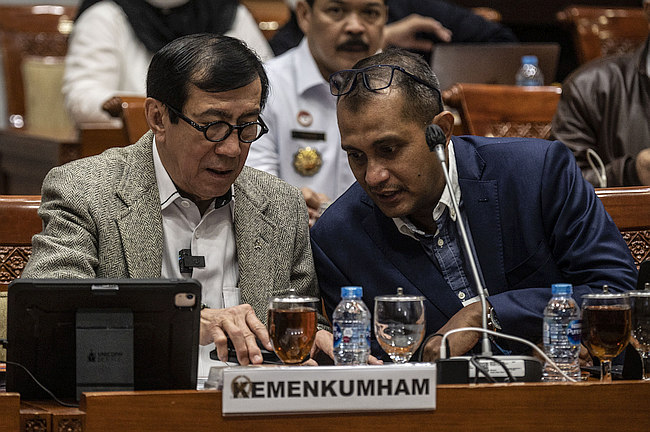Indonesia clarifies that the New Criminal Code was drafted carefully and obeys Human Rights aspects, following the emergence of reactions related to the ratification of the code.

Deputy Minister of Law and Human Rights Edward Omar Sharif Hiariej on Friday stated the criminal code was drafted carefully by paying attention to the balance of the interests of individuals, the state, and the public and by taking into account Indonesia’s multi-ethnic, multi-religious, and multi-cultural condition.
Some of the articles criticized by the public include those related to privacy, freedoms of the press, and human rights. One of the issues is regarding the adultery and cohabitation articles in the code.
Hiariej clarified that the adultery and cohabitation articles are complaint-based. Thus, the perpetrator should only be prosecuted on the basis of a complaint, which can only be made by their spouse (for those who are married) or parents or children (for those who are not married).
The articles, he says, are aimed at protecting people from acts of arbitrariness. “When these articles are regulated in the criminal code, there would definitely be no raids,” he added.
Additionally, the Spokesman of the Dissemination Team of the New Criminal Code, Albert Aries, clarified the criminal code has never given additional administrative requirements for tourism players to question people about their marital status. Aries affirmed that people’s privacy is still guaranteed by law in Indonesia, of course, without reducing respect for the values that the country holds.
A criminologist from the University of Indonesia, Adrianus Meliala, expressed optimism that the implementation of the cohabitation article will not violate human rights since it is complaint-based. He said that law enforcement officers must face the discourse with real actions.
Apart from adultery and cohabitation, freedom of expression and freedom of the press are among the issues that have been addressed.
Regarding freedom of expression, deputy minister Hiariej stated that the new criminal code made a clear distinction between critics and defamation. He explained that critics should not be criminalized as they are in the interest of the public in a democratic society, while defamation is deemed a criminal act in any country.
He further said that the freedom of the press is also ensured as the criminal code adopted one of the provisions of the Law on the Press, which states that critics are a form of supervision or public scrutiny.
The spokesman Aries affirmed that the criminal code is in accordance with human rights. “It is not true to say that the Indonesian Criminal Code is inconsistent with human rights,” he stated. The criminal code, says Aries, regulates everything by paying attention to the balance between human rights and human obligations.
In order to pay respect to the general law principles that apply universally, the criminal code adopts the substance of the Convention for the Protection of Human Rights and Fundamental Freedoms (Treaty of Rome 1950). The code also adopts the International Covenant on Civil and Political Rights (the New York Convention, 1966), and the Convention against Torture and other Cruel, Inhuman or Degrading Treatment or Punishment, December 10, 1984.
Written by: Raka Adji, Editor: Rahmad Nasution (c) ANTARA 2022















